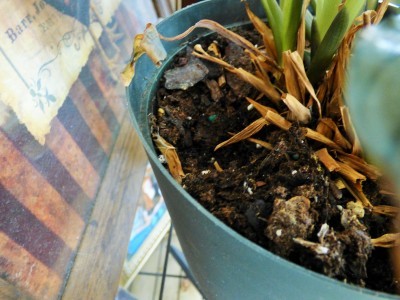






Finding a series of holes dug into your houseplants can be frustrating, but holes in potted plants aren’t uncommon, especially in the fall and winter. As the weather gets cooler, rodents often seek shelter indoors. Even though they don’t necessarily eat houseplants, rodents often see the loose potting soil as a great place for storing bits of found food and can cause a lot of damage rummaging around.
Any time you’ve got mice digging up houseplants, you’ve got a problem that reaches far beyond just your indoor greenery. Your first and foremost goals should be to eliminate the mouse doing the digging and preventing more mice from doing the same. A house cat allowed to roam freely at night is one of the best control methods for mice, but if you don’t have a cat or Fluffy is laying down on the job, snap traps are almost as effective.
While you’re hunting the mouse, you’ll also need to be looking for his secret passage into your home. Check small, tight spaces that lead directly to the outdoors, like areas where plumbing or ventilation enter the home, large cracks at wall and floor joints or dark corners of cabinets where a mouse could have chewed through the wall. Stuff any holes you find full of steel wool to prevent new mice from entering your home.
The reason your houseplant keeps getting dug up is because the mouse in question is using it to store food, so make sure you’re cutting off that supply, as well. If he’s eating the dog’s food, store the bag in an airtight container and feed Fido regular meals, removing any leftovers after he’s had a chance to eat. Mice that are eating human food scraps should be dealt with in the same way – seal your cereal, flours and any other easy to access foods away from the rodent’s sticky fingers.
Sometimes, gardeners will complain of fairly large holes appearing in their outdoor pots early in the morning. If you happen to live near a water source, this phenomenon is probably caused by young toads. As tadpoles mature into the adult toads that anyone would recognize, they go through a number of growth stages. Their last stage is often carried out in moist, loose soil – much like what’s in your outdoor planters. Toads in pots only need a few days to fully mature, and when they do, they leave a big hole behind.
You can discourage toads by covering your planter’s soil with gravel or simply cutting back on the watering. After all, the dry soil won’t support their further development, so is no cause for interest.
Copyright © www.100flowers.win Botanic Garden All Rights Reserved